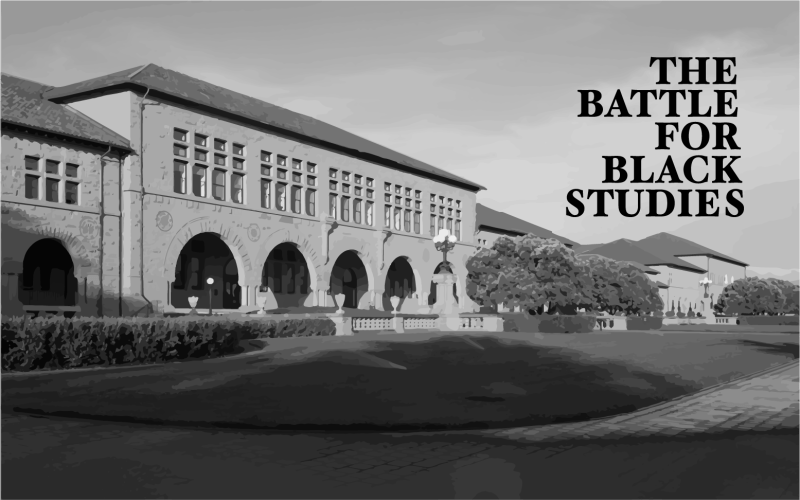The Battle for Black Studies is an article series run in collaboration with the Black Graduate Student Association (BGSA) and the Black Student Union (BSU). It comes amid a decades-long struggle for a department of African and African American Studies at Stanford. This series, however, is not only born out of a desire to highlight the need for a departmentalized AAAS program — it is an ongoing project of imagining and theorizing possibility, in line with the long tradition of Black Studies. It is a project of education, addressing the realities of race and fighting for a more equitable future. We hope you will join us.
As a junior at Stanford, I was asked by one of my professors during his office hours, “What would you recommend that other white people read to become better allies?” It was and is a frustrating question, because it assumes that there is a magic answer, one article on “Ten Ways to Be Less Racist” that will put people on an imagined path to racial justice. Asking this question continues to center whiteness, and prioritizes work that is written for white consumption and for white conversion to the cause of allyship. Questions like this miss so much, and yet they are emblematic of Stanford’s approach to addressing issues of race, and why that approach fails. When I came to Stanford, I knew that I wanted to contribute to racial justice work in some way. With that vague idea in mind, I joined the NAACP, got a job at the Martin Luther King, Jr. Research and Education Institute and attended events with speakers sharing their work on topics like criminal justice, education and housing. In all of these places, I realized that students and professors in African and African American Studies were leading the efforts, bringing the most thoughtful perspectives, and challenging my thinking the most. Black Studies doesn’t exist for me as a white person, but I am confident that learning about Black history, resistance and liberation was by far the most meaningful and rigorous education that Stanford could offer me.
Last summer, in the aftermath of renewed national attention to police murder of Black people, it seemed like “anti-racist” books and reading lists were everywhere. Alongside calls to self-educate were those to support Black-owned businesses. However, when the same popular titles — such as
“So You Want to Talk About Race” by Ijeoma Oluo, “How to Be an Antiracist” by Ibram X. Kendi and “White Fragility” by Robin DiAngelo — began to sell out everywhere, frustrated responses by both white would-be anti-racists and white journalists demonstrated the futility of this quick-fix approach to racism. As DL Mullen, owner of Semicolon, Chicago’s only Black woman-owned bookstore, wrote: “The ‘Black booksellers can’t handle a ton of orders’ is the wrong narrative to try to push right now, journalists. We can. We are. We do. Regularly. Let’s try to be a tad more creative with the bylines, ie: ‘A Rush to Purchase the Same 5 ‘Anti-Racist’ Titles Creates Backorders and Proves that’s [sic] the Real ‘White Fragility’ is Practicing Patience.’” Mullen is pointing out not only white hypocrisy and entitlement, but also implicitly challenging the usefulness of the idea of a book that can bring one to a place of anti-racism.
Stanford’s response to calls for more support for Black scholarship, Black faculty and Black students similarly falls short. Instead of recognizing the wealth of knowledge and leadership that the African and African American Studies program already brings to campus despite the limitations of its program status, Stanford promised to create three new initiatives related to “the impacts of race in America.” When it comes to meeting the demands to provide further support to existing programs, in particular the Martin Luther King, Jr. Research and Education Institute and AAAS, Stanford offers only to consider, to conduct studies, to hold conversations, to create strategies. This is the language of racism — slowing progress and willfully ignoring the conversations, strategies, and demands that have been put forward time and time again by Black students, professors, and alumni. The idea that 2020 provided a kind of new moral clarity is ahistorical, forgetting the long history of activism at Stanford that has pushed for change and the many demands that have yet to be met. By pretending that these ideas and conversations are new, Stanford seeks to absolve itself of its past inaction.
Stanford was the first private university to start an African and African American Studies program not because of its own benevolence or commitment to justice but because, in 1968, after Dr. King’s assassination, a group of 70 students from the Black Student Union took the microphone from the provost during an event called “Colloquium and Plan for Action: Stanford’s Response to White Racism.” Black students offered a plan of their own, and BSU Chair Keni Washington demanded: “Put your money and your action where your mouth is.”
Stanford has another opportunity to put its money where its mouth is. There is no need to look for magic solutions or flashy anti-racism branding. Stanford can honor the demands made by students in 1968 and every year since then by not only making a Black Studies department, but by providing it the funding and institutional resources it needs to thrive.
Jessie Schrantz is a second-year MSW student at University of Illinois at Chicago and an intern with the Chicago Torture Justice Center. She graduated from Stanford in 2017 with a degree in African & African American Studies and minors in Spanish and Public Policy.
Contact Jessie Schrantz at jessicaschrantz ‘at’ gmail.com.
The Daily is committed to publishing a diversity of op-eds and letters to the editor. We’d love to hear your thoughts. Email letters to the editor to eic ‘at’ stanforddaily.com and op-ed submissions to opinions ‘at’ stanforddaily.com.
